
Performance, reliability, and customer trust are what really matter for running an eCommerce store, it’s no longer just the products and attractive design. Behind every quick page load and seamless checkout is a hosting provider that can handle the technical demands of modern eCommerce.
eCommerce hosting is the specialized web service that keeps your store’s files, manages traffic, runs databases, and guarantees security. Essentially, it’s what keeps your virtual doors open 24/7. The best hosting goes beyond just staying online. It’s about scalability, security, and optimizing every single click to boost your conversions.
The provider you choose directly controls your costs, future growth, and daily performance. A slow or unstable site doesn’t just annoy visitors; it actively loses sales and ruins customer relationships.
This guide lists the best eCommerce hosting providers. They offer good prices, scalability, and reliability. This will help you find the right hosting provider for your current growth stage.
What Growing Online Stores Really Need from Hosting
Before we dive into comparisons, let’s understand what differentiates eCommerce hosting from general web hosting. A store that’s actually focused on growth needs a host that delivers on these five points:
- Speed is Essential: Every second counts. Page speed directly affects your conversions, bounce rates, and SEO performance. Your store must load fast.
- Handle Traffic Spikes: Your hosting should manage large traffic surges during busy seasons and sales events without slowing down or failing, and choosing good hosting is a core part of effective eCommerce SEO strategies.
- Core Security: You need free SSL certificates, firewalls, and daily backups. These tools will help protect customer data and transaction details.
- Easy Management: The hosting setup should be simple. Look for straightforward dashboards, automatic updates, and one-click installs so you can focus on sales, not server maintenance.
- 24/7 Support: If an issue occurs, you need responsive, knowledgeable support right away. Quick resolution is vital, especially during critical sales periods.
Put simply, eCommerce hosting provides a growing online store with the speed, security, and ease of management it needs. Along with this, it also enables these eStores to handle traffic spikes, especially when selling on top eCommerce platforms. It also demands reliable 24/7 support to keep your site running smoothly during crucial sales periods.
eCommerce Hosting Comparison at a Glance
| Provider | Platforms Supported | Starting Price | Ratings |
|---|---|---|---|
| Cloudways | WooCommerce, Magento, OpenCart, custom PHP | 4.7(1089) | |
| SiteGround | WooCommerce, PrestaShop | 4.2(284) | |
| Hostinger | WooCommerce, OpenCart | 4.4(763) | |
| Nexcess | WooCommerce, Magento | 3.3(29) | |
| Kinsta | WooCommerce (WordPress only) | 4.8(1342) | |
| Bluehost | WooCommerce | 3.4(227) | |
| A2 Hosting | WooCommerce, Magento, OpenCart | 4.4(203) | |
| DreamHost | WooCommerce, general eCommerce | 4.1(190) | |
| InMotion Hosting | WooCommerce, PrestaShop | 4.3(93) | |
| GoDaddy | WooCommerce, general eCommerce | 4.0(2027) |
Top eCommerce Hosting Providers in 2026
1. Cloudways
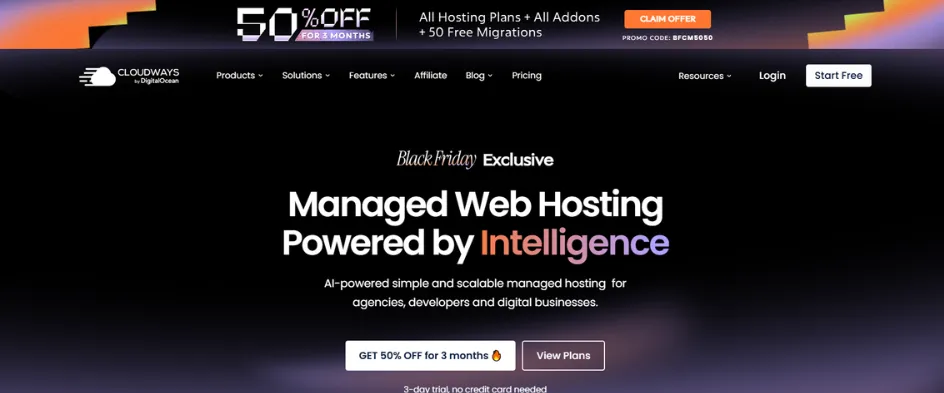
Cloudways is the ideal solution for eCommerce stores that have outgrown shared hosting and need both flexibility and performance. It bridges the gap between raw cloud hosting performance (like AWS or Google Cloud) and ease of use. They handle the complex technical tasks, such as setup, optimization, and maintenance. Users can choose their favorite cloud provider, such as AWS, Google Cloud, DigitalOcean, Vultr, or Linode.
Their stack includes built-in caching like Varnish, Redis, and Memcached — this helps speed up product pages, carts, and checkout. They also provide two-factor authentication, IP whitelisting, and free Let’s Encrypt SSL out of the box, giving you strong security without extra effort.
Key Features:
- Supports WooCommerce, Magento, OpenCart, and custom PHP frameworks
- Access to 65+ global data centers for faster content delivery
- Automated backups, SSL, and performance monitoring
- One-click vertical scaling for CPU, RAM, and storage
- Optimized stack (Nginx, Varnish, Redis, PHP-FPM) for low-latency performance
- 24/7 expert support through live chat and tickets
Ideal for: eCommerce stores or businesses managing multiple stores
Starting at: $11/m (pay-as-you-go)
Consideration: Slightly more technical than entry-level shared hosting
Know more about Cloudways managed hosting.
2. SiteGround
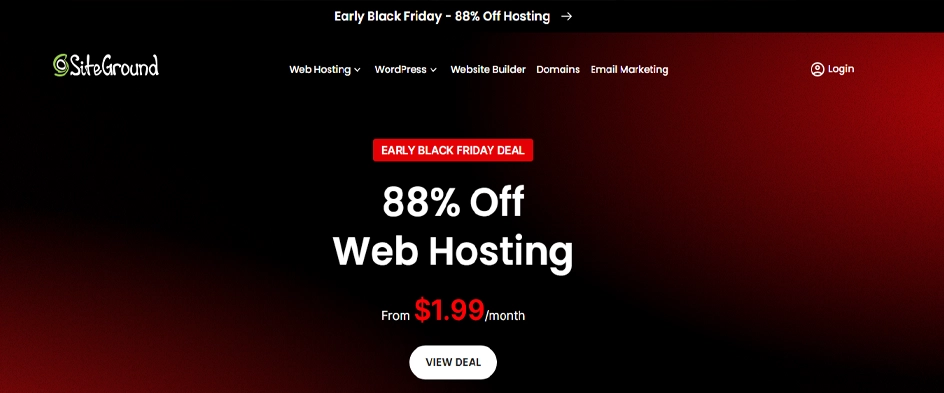
SiteGround is a well-known name in managed WordPress and shared hosting. It runs completely on Google Cloud. Many people recognize it for its uptime and customer support, making it the best fit for small-to-medium online stores running on WooCommerce.
SiteGround also gives you automatic WordPress and WooCommerce updates, plus a staging tool so you can test changes before publishing live. On performance, they use multilevel caching (full-page, dynamic, and Memcached), optimized for eCommerce, to ensure the cart and checkout stay snappy. They back your store with free SSL, daily backups stored across multiple locations, and an AI anti-bot system that filters out malicious traffic.
Key Features:
- Free SSL, CDN integration, and daily automated backups
- Optimized servers for WordPress and WooCommerce
- Built-in caching and security protection
- Easy-to-use dashboard for all site management tasks
Ideal for: SMBs that value reliability, support, and hands-off operation
Starting at: $3.99/month
Consideration: Renewal rates increase significantly after the introductory discounted price; Plus, resource flexibility is limited when compared to dedicated cloud setups.
3. Hostinger
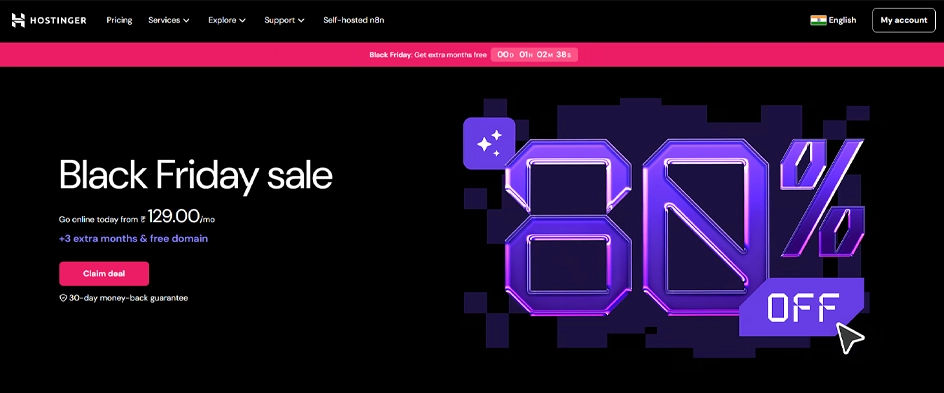
Hostinger is recognized for offering budget-friendly eCommerce hosting solutions. It offers good value for new and small to medium-sized stores. It is accessible and fully supports key platforms like WordPress, WooCommerce, and other PHP-based CMS. If your goal is to launch quickly on a tight budget, Hostinger is the best starting point.
Their managed WooCommerce plan uses LiteSpeed servers and the LSCWP cache plugin to speed up catalog and checkout pages. It includes a global CDN, HTTP/3 support, and IPv6 to deliver content quickly worldwide. For security, they provide automatic backups, a firewall, and DDoS protection to keep your customers’ data safe.
Key Features:
- Free domain and SSL with long-term plans
- NVMe storage and caching for faster response times
- WooCommerce and OpenCart compatibility
- Easy-to-use & custom-built hPanel interface
Ideal for: Entrepreneurs and small business owners launching their first online store
Starting at: $12.95/month
Consideration: Entry-level plans have limited server resources; upgrades may be needed as traffic grows.
4. Nexcess

Part of the Liquid Web family, Nexcess is purpose-built for eCommerce. It focuses on stores using platforms like Magento and WooCommerce. It offers managed environments designed for high-performance online retail. If you’ve been consistently growing and need a professional-grade solution, Nexcess is the answer.
Their WooCommerce hosting includes free Object Cache Pro and extra PHP workers to keep checkout and product searches fast. They also use a global CDN from Cloudflare to speed up images, scripts, and product info for visitors everywhere..
Key Features:
- Auto-scaling for high-traffic events like flash sales
- PCI-compliant servers for secure transactions
- Daily backups, one-click staging sites, and free SSL
- eCommerce-optimized servers for better performance and reliability
Ideal for: Established eCommerce stores with consistent sales and growth
Starting at: $5/month
Consideration: Slightly higher starting cost than entry-level shared hosting
5. Kinsta
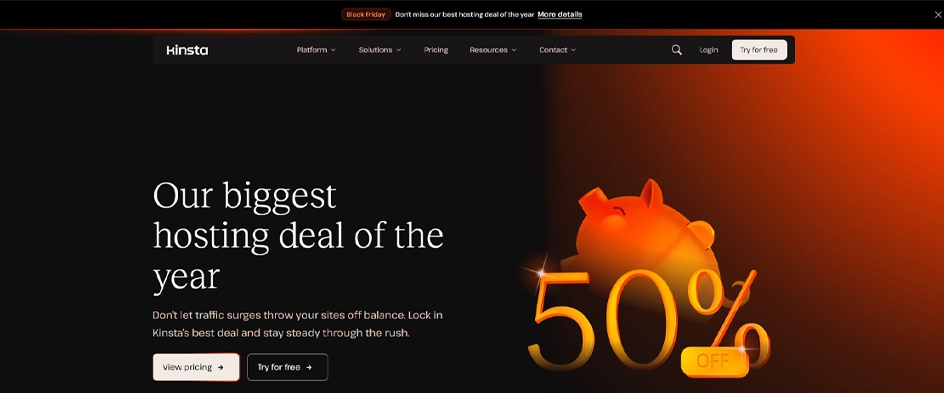
Kinsta provides premium managed WordPress and WooCommerce hosting built on Google Cloud’s C2 machines. It is the top choice for businesses seeking speed and robust security. You won’t have to worry about any technical maintenance.
Their infrastructure is compute-optimized, meaning your store benefits from very fast dynamic page loads. They offer edge caching across over 300 locations, helping serve your content from the closest point to your users and dramatically reducing latency. Kinsta also excludes key WooCommerce pages (such as the cart and checkout) from caching, ensuring customers always see accurate, up-to-date data.
Key Features:
- Free CDN, SSL, and daily backups
- Auto-scaling and server-level caching
- Dashboard for production and staging environments
- 24/7 WordPress expert support
Ideal for: High-performing WooCommerce stores needing reliability and scalability
Starting at: $35/month
Consideration: Only supports WordPress-based stores
6. Bluehost
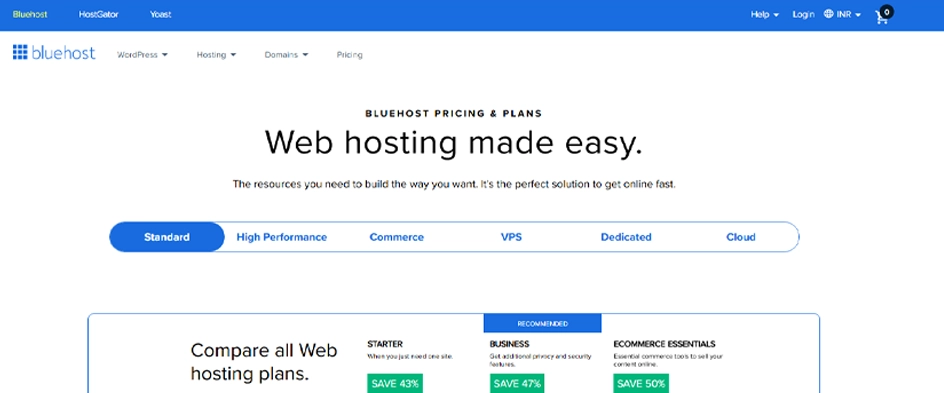
Bluehost is the entry-level host for anyone using WordPress, officially recommended by WordPress.org. It comes ready to use with WooCommerce. This makes it very easy for new store owners to start online quickly and affordably.
They pre-install WordPress and WooCommerce when you sign up for their WooCommerce plans, so your store is ready almost immediately. The plans also include SSL, unmetered bandwidth, and a free domain for the first year, helping cut your initial costs. For security and reliability, they offer daily backups, multi-layer caching, dedicated IP options, and 24/7 support to assist you whenever you face issues.
Key Features:
- One-click, simple WooCommerce setup
- Free domain (first year) and SSL
- Unmetered bandwidth and marketing integrations
Ideal for: New store owners looking for a straightforward, budget-friendly solution
Starting at: $3.99/month
Consideration: Limited performance for larger sites or sudden traffic spikes
7. A2 Hosting
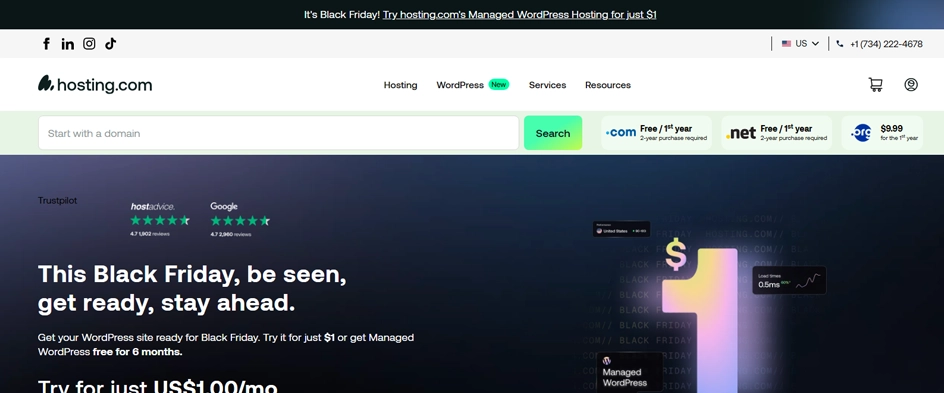
A2 Hosting is built for speed and developer flexibility. It provides “Turbo” servers and customizable environments. This makes it a good choice for users who want detailed control over their hosting setup.
Its Turbo servers use LiteSpeed, which supports more users at once. You can pick PHP versions, adjust MySQL settings, and fine-tune your setup as your store grows. A2 also supports popular eCommerce platforms like WooCommerce, Magento, PrestaShop, and OpenCart, so you can switch easily if needed.
Key Features:
- Turbo servers for faster page loads
- SSD/NVMe storage and LiteSpeed web server
- Free site migration, SSL, and Git integration
- Multiple data center choices for lower latency
Ideal for: Developers or business owners needing performance tuning options
Starting at: $1.99/month
Consideration: Slightly more setup effort than managed services
8. DreamHost

DreamHost is known for its long, reliable history and transparent pricing. Like Bluehost, it’s another official provider recommended directly by WordPress.org, making it a safe choice for dependable, long-term hosting.
They offer SSD storage in most plans to keep your store fast as it grows or gets more visitors. Their WooCommerce-friendly plans have no hidden renewal fees. DreamHost’s custom control panel lets you easily manage your site, from staging to manual backups, without being complicated.
Key Features:
- Free SSL, domain (first year), and automated backups
- Managed WordPress and WooCommerce support
- Built-in caching and solid uptime
Ideal for: Store owners wanting stable, hands-off hosting
Starting at: $2.99/month
Consideration: Support and performance optimizations may not match specialized eCommerce hosts
9. InMotion Hosting
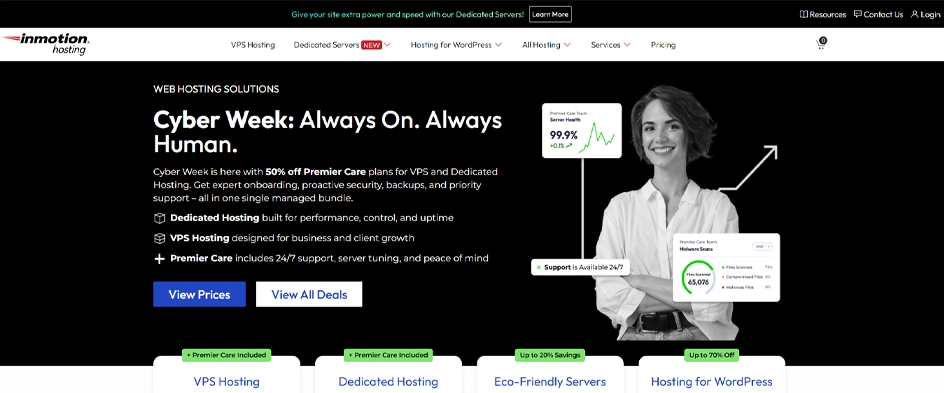
InMotion Hosting offers business-class hosting optimized for eCommerce platforms like PrestaShop and WooCommerce. They provide reliable service backed by excellent, accessible support.
Their shared and VPS plans include SSD storage, PHP version control, and optimized setups to boost store speed. You also get DDoS protection and automatic backups to keep your data safe and easy to restore. Their support team is well-versed in eCommerce. They assist with migrations, performance tuning, and scaling your store as traffic grows.
Key Features:
- Free SSL and security tools
- Pre-configured eCommerce apps included
- 24/7 US-based support
Ideal for: Small and medium businesses needing dependable performance and strong support
Starting at: $14.99/month
Consideration: Entry plans may require upgrades for high traffic
10. GoDaddy

GoDaddy is often the first name people search for. It offers easy, all-in-one hosting plans for WordPress and online stores. They are ideal if you prefer to manage your domain name, email, and hosting all under one convenient account.
GoDaddy also offers global data center options and a CDN, which helps your pages load faster for customers in different regions. Their support is very accessible: you can reach them by phone or chat, and they have extensive documentation.
Key Features:
- Free SSL and domain (first year) on many plans
- One-click WordPress and WooCommerce installation
- Global data centers and 24/7 network security
Ideal for: Beginners wanting hosting and domain setup under one roof
Starting at: ~$5.99/month
Consideration: Performance and resource options might be limited. Also, be aware of potential higher renewal costs after the initial discount period.
Conclusion
The best eCommerce hosting combines speed, scalability, and security, ensuring every customer interaction is fast, safe, and smooth.
- Hostinger and SiteGround are excellent for new or small stores focused on affordability and simplicity.
- Nexcess and Kinsta cater to established eCommerce operations demanding performance and managed environments.
- Cloudways offers a strong balance across all stages, blending scalability, flexibility, and managed simplicity through cloud architecture.
The best hosting platform for you depends on your business size, tech skills, and growth plans. In 2026, the hosts listed above are top choices for eCommerce success.
Frequently Asked Questions
What is eCommerce hosting?
eCommerce hosting provides the infrastructure for running online stores, managing product data, traffic, and secure transactions.
Which hosting is best for growing online stores?
Managed cloud platforms like Cloudways are great for scaling and performance. SiteGround and Hostinger are better for smaller stores.
How much does eCommerce hosting cost?
Entry-level plans start between ~$2–$5/month, while managed cloud hosting typically begins around ~$10–$15/month.
Can I switch hosts later?
Yes. Most providers offer free or assisted migrations for a seamless transition.
Do I need special security for eCommerce sites?
Absolutely. SSL certificates, PCI compliance, and daily backups are essential for protecting customer data and payment information.




